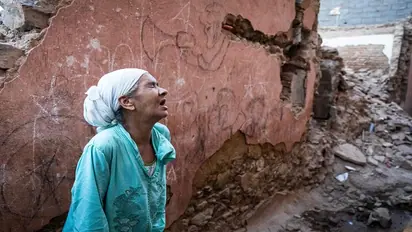Morocco earthquake: Aerial footage reveals extent of damage; horrifying videos of aftermath go viral - WATCH

Synopsis
Morocco grapples with the aftermath of its deadliest earthquake in decades, prompting national mourning, international support, and extensive recovery efforts.
Morocco is reeling from the aftermath of its deadliest earthquake in decades, with authorities reporting a death toll of more than 2,000 people as of Saturday. The catastrophe has prompted a massive response effort as troops and emergency services rush to reach remote mountain villages where additional victims may still be trapped. In response to the devastating earthquake, Moroccan authorities declared three days of national mourning. However, the Red Cross has cautioned that repairing the extensive damage may take years, highlighting the enormity of the disaster.
The earthquake, with a magnitude of 6.8, struck late on a Friday in a mountainous area located 72 kilometers (45 miles) southwest of the popular tourist city of Marrakesh, according to the US Geological Survey. Its impact was far-reaching, with strong tremors also felt in coastal cities such as Rabat, Casablanca, and Essaouira. The sudden quake caused widespread destruction and sent residents and tourists alike scrambling for safety during the night.
Residents and visitors alike were caught off guard by the earthquake's violent shaking. Ghannou Najem, an elderly Casablanca resident visiting Marrakesh at the time, described the frightening experience, saying, "I was nearly asleep when I heard the doors and the shutters banging. I went outside in a panic. I thought I was going to die alone."
In the mountain village of Tafeghaghte, near the earthquake's epicenter, the devastation was profound. Virtually no buildings remained standing, and the traditional clay bricks used by the region's Berber inhabitants were no match for the rare seismic event. Soldiers combed through debris in search of survivors, but many villagers were already mourning the loss of loved ones.
This earthquake marked the strongest-ever recorded in Morocco, and experts have described it as the most powerful seismic event in the region in over 120 years. Bill McGuire, a professor emeritus at Britain's University College London, noted that in regions where destructive earthquakes are infrequent, buildings are often not constructed to withstand such forces, leading to a higher casualty rate.
The latest figures from the Moroccan interior ministry on Saturday evening reported that the earthquake had claimed at least 2,012 lives, with the majority of casualties occurring in Al-Haouz, the epicenter, and Taroudant provinces. An additional 2,059 individuals sustained injuries, including 1,404 in critical condition, according to the ministry.
Colonel Hicham Choukri, leading the relief operations, described the situation as "an exceptional emergency" due to the epicenter's location and the quake's intensity. Following a meeting chaired by King Mohammed VI, the Moroccan palace announced three days of national mourning, with flags flying at half-mast on public buildings.
Foreign leaders expressed condolences and offered assistance, including Israel, which normalized relations with Morocco in 2020. Algeria, a neighbor and regional rival, announced it was temporarily lifting a two-year-old ban on Moroccan flights through its airspace to facilitate aid deliveries and medical evacuations.
The tragic earthquake in Morocco serves as a poignant reminder of the vulnerability of regions unaccustomed to significant seismic activity. While the nation grapples with the immediate aftermath, the road to recovery and reconstruction will be long and challenging, underscoring the importance of global solidarity in times of crisis.
Check the Breaking News Today and Latest News from across India and around the world. Stay updated with the latest World News and global developments from politics to economy and current affairs. Get in-depth coverage of China News, Europe News, Pakistan News, and South Asia News, along with top headlines from the UK and US. Follow expert analysis, international trends, and breaking updates from around the globe. Download the Asianet News Official App from the Android Play Store and iPhone App Store for accurate and timely news updates anytime, anywhere.